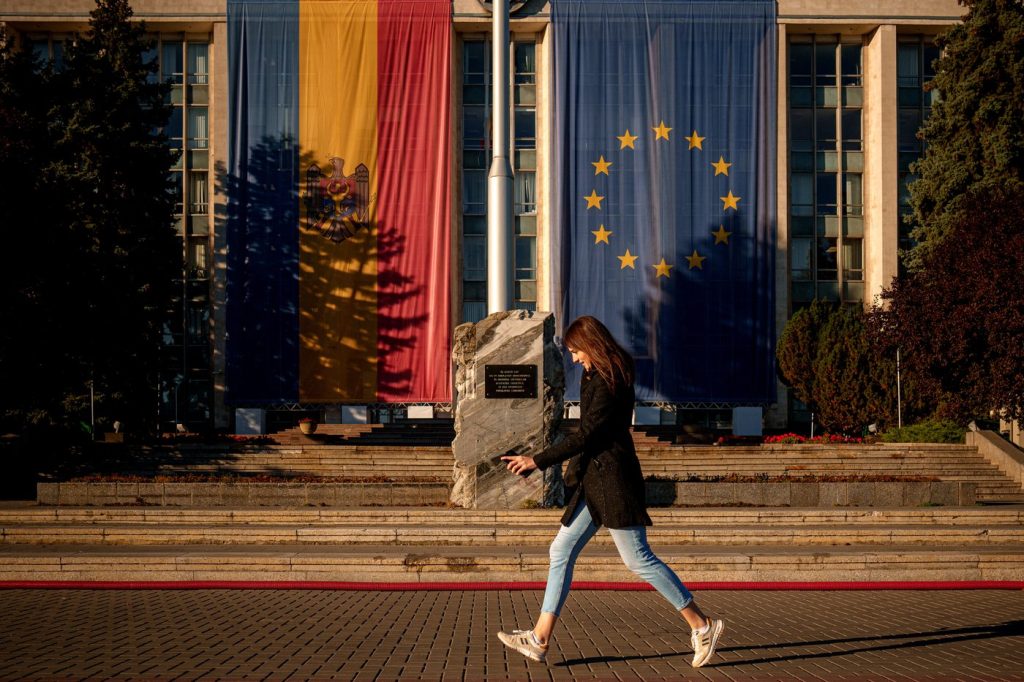CHISINAU, Moldova (AP) – Moldovans are heading to the polls on Sunday to participate in a crucial parliamentary election marked by allegations of Russian interference. The outcome of this election may significantly determine Moldova's geopolitical trajectory, defining a choice between alignment with the European Union (EU) or Moscow.
Located between Ukraine and EU member Romania, Moldova has been moving towards closer ties with the West in recent years. The election aims to fill the 101-seat parliament, with the results potentially influencing whether the country continues on its EU pathway or reverts to Russian influence. The ruling Party of Action and Solidarity (PAS), which has maintained a strong parliamentary presence since 2021, is facing off against various Russia-friendly factions without any significant pro-European competitors, leading to uncertainty about the election outcomes.
If PAS does not secure a majority, Igor Grosu, the PAS leader and current speaker of parliament, warned that it could spell the end of EU integration, halting key reforms and infrastructure projects. He emphasized, "There is no middle option," indicating the stakes involved in this election.
A key factor affecting the election outcome will be voter turnout and the effectiveness of Moldovan authorities in countering alleged Russian hybrid tactics aimed at disrupting the country’s journey towards the EU. Prime Minister Dorin Recean highlighted that Russia is reportedly investing hundreds of millions of euros to "seize power in Chisinau" through increasingly radical methods. Allegations include widespread vote-buying, cyber attacks, planned riots, and a substantial online disinformation campaign aimed at influencing voters.
In response to these threats, Moldovan authorities have undertaken numerous raids, resulting in the detention of several individuals. President Maia Sandu has accused the Kremlin of having local accomplices, expressing concern for those “willing to sell out their country for money.” However, Moscow has consistently denied all allegations of interfering with Moldovan elections, describing them as "anti-Russian" and unfounded.
The upcoming vote follows a recent referendum where Moldovans voted narrowly in favor of pursuing EU integration. However, that vote was overshadowed by widespread claims of Russian interference and a massive vote-buying scheme, both of which Moscow denied. As Moldovans prepare to vote, they face challenges such as high inflation and rising poverty rates, which could influence public support for the ruling government.
To assist Moldova, Brussels has committed up to 1.9 billion euros ($2.2 billion) from 2025 to 2027, including 270 million euros already released for essential projects like new hospitals and energy cost relief. Amidst the economic hardships, residents like Eugen, a 41-year-old artist from Chisinau, advocate for continued EU integration, though he acknowledges voter fatigue stemming from unmet expectations.
The Russia-friendly Patriotic Electoral Bloc (BEP) is one of PAS's main opponents in the election, promoting "friendship with Russia" and "permanent neutrality." In a controversial move, the Central Electoral Commission excluded the Heart of Moldova party, a member of BEP, from the election following a ruling that restricted its activities due to allegations of illegal financing and voter bribery. The commission's actions were condemned by party leader Irina Vlah, who labeled them as politically motivated attacks.
Igor Dodon, a former pro-Russian president leading the Socialist Party within BEP, warned that the ruling PAS's "days are numbered," further politicizing the election atmosphere. In addition to Heart of Moldova, the Moldova Mare party was also disqualified due to financial irregularities and problems related to funding from pro-Russian sources.
Moldova's significant diaspora is anticipated to influence the election significantly, as evidenced by the record turnout seen in last year's presidential run-off. Many believe that absentee voters are likely to favor pro-Western candidates, adding to the uncertainty for local polling, which does not adequately account for diaspora sentiment. With roughly a third of voters still undecided, the final voter turnout remains uncertain, especially considering that previous elections witnessed turnout rates around 48%.
Iulian Groza, the executive director of a think tank focused on European policies, stated that the stakes are high for Russia, viewing the elections as a pivotal battle for influence in the region. The impact of disinformation campaigns is also highlighted, with experts warning that while economic conditions may sway some voters away from PAS, Russian interference and disinformation could exacerbate the decline in support. Online narratives often rely on complex conspiracies, and the intensification of false information could drastically shift voter perspectives.











